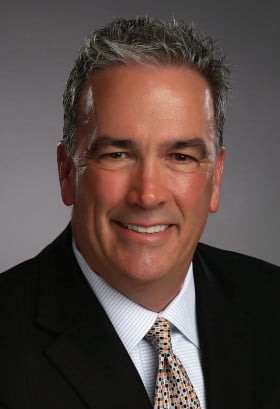Drs. Joel Small and Edwin McDonald discuss controlling our emotions, choosing words carefully and impacting those around us.
Drs. Joel Small and Edwin McDonald discuss the power and consequences of words
There is an old saying that our success is determined by the “three A’s” — ability, availability, and affability. There is no question that ability and availability are key components for success of any clinical healthcare practice. Affability is a curious quality, however.
 In recent years, the “softer skills” of affability have been well researched and have now risen in stature among the critical three A’s. Daniel Goldman refers to these softer skills as “emotional intelligence” in his seminal book of the same name. Becoming emotionally intelligent is a process through which we become acutely aware of our responses and how we show up in any given situation. It is defined as the capacity to be aware of, control, and express one’s emotions, and to handle interpersonal relationships judiciously and empathetically. Critical to this acquired skill is our degree of self-awareness and the ability to self-regulate.
In recent years, the “softer skills” of affability have been well researched and have now risen in stature among the critical three A’s. Daniel Goldman refers to these softer skills as “emotional intelligence” in his seminal book of the same name. Becoming emotionally intelligent is a process through which we become acutely aware of our responses and how we show up in any given situation. It is defined as the capacity to be aware of, control, and express one’s emotions, and to handle interpersonal relationships judiciously and empathetically. Critical to this acquired skill is our degree of self-awareness and the ability to self-regulate.
Emotional intelligence has become so highly regarded as a leadership competency that there are now widely used assessments to gauge a person’s level of emotional intelligence. The EQ2 assessment is one of these assessments that is widely used by executive coaching professionals. It is often used in conjunction with other leadership profiles such as the Leadership Circle Profile 360 (LCP 360). In combination, these two assessments are commonly used in developing personalized leadership development plans for many of U.S. best corporate leaders.
Viktor Frankl in his groundbreaking book, Man’s Search for Meaning, offers this poignant thought:
“Between stimulus and response, there is a space. In that space is our power to choose our response. In our response lies our growth and our freedom.”
Often this space between the stimulus and response is a brief, yet critical, millisecond. Each of us faces pivotal moments in our personal and professional lives when a given response in a critical situation could have a profound and enduring future impact with significant consequences.
Emotional intelligence is dictated by the responses we choose and can make the difference between success and failure, a committed or compliant staff, or a transformational versus a transactional organizational culture. In our personal lives, the responses we choose may determine the quality of interpersonal relationships or even our family dynamics.
Unfortunately, we often choose the wrong response because we unconsciously default to spontaneous knee-jerk reactions rather than making a thoughtful appropriate choice. These thoughtless knee-jerk responses are blind spots that occur at an unconscious level. Many believe that these spontaneous reactions are caused by deeply engrained responses that have become habitual and originate from beliefs and assumptions that we have brought forth from past experiences. Because we are unaware of these blind spots, making a conscious choice to respond differently is difficult.
So how do we go from autopilot to making a thoughtful response in these critical milliseconds? Self-awareness is the answer. Understanding the critical nature of our responses and acknowledging that we have a habitual blind spot when choosing an appropriate response is the key. Only then can we short-circuit the reactive knee-jerk response in favor of an emotionally intelligent response.
Carl Jung, the noted psychologist, is quoted as saying:
“Until we make the unconscious conscious, it will direct our lives, and we will call it fate.”
Bringing the unconscious to a conscious level is a critical step in substituting a mindful, constructive response for a mindless, reactive one. Having this conscious awareness of our habitual default response is also vital to our ability to self-regulate: a mental process through which we control our emotions in favor of making the appropriate response in any situation. Self-regulation allows us to stop, if even for the briefest moment, and even when emotions run high, to consider our best possible response. There would seem to be some truth that our fate, good or bad, is determined by our choice between responding purposefully or defaulting to an inappropriate spontaneous reaction.
As the world in which we practice becomes more volatile, uncertain, and complex, our day-to-day stress level increases. The same is true for our staff. When their stress levels peak, they look to us for reassurance and guidance. We must be the calm in their storm by offering support and reassurance. It is during these times of crisis that our responses become magnified and most impactful. These are the moments when the appropriate response is critical. These are the moments when a millisecond can change everything.
Emotional intelligence requires an ongoing awareness of how we are impacting those around us. Carefully choosing our responses and the words we use are part of becoming emotionally intelligent. Words are powerful, and responses have consequences. Choose them wisely.
One of the most powerful ways of impacting those around us is by leading through change. Find out how Joel Small brings about orderly and peaceful change within a practice: https://endopracticeus.com/columns/leading-through-change/.
Stay Relevant With Endodontic Practice US
Join our email list for CE courses and webinars, articles and more..

 Drs. Joel Small and Edwin (Mac) McDonald have a total of over 75 years of dental practice experience. Both doctors are trained and certified Executive Leadership Coaches. They have joined forces to create Line of Sight Coaching, a business dedicated to helping their fellow dentists discover a better and more enjoyable way to create and lead a highly productive clinical dental practice. Through their work, clients experience a better work/life balance, find more joy in their work, and develop a strong practice culture and brand that positively impact their bottom line. To receive their free ebook, 7 Surprising Steps to Grow Your Practice Through Leadership, go to
Drs. Joel Small and Edwin (Mac) McDonald have a total of over 75 years of dental practice experience. Both doctors are trained and certified Executive Leadership Coaches. They have joined forces to create Line of Sight Coaching, a business dedicated to helping their fellow dentists discover a better and more enjoyable way to create and lead a highly productive clinical dental practice. Through their work, clients experience a better work/life balance, find more joy in their work, and develop a strong practice culture and brand that positively impact their bottom line. To receive their free ebook, 7 Surprising Steps to Grow Your Practice Through Leadership, go to 
